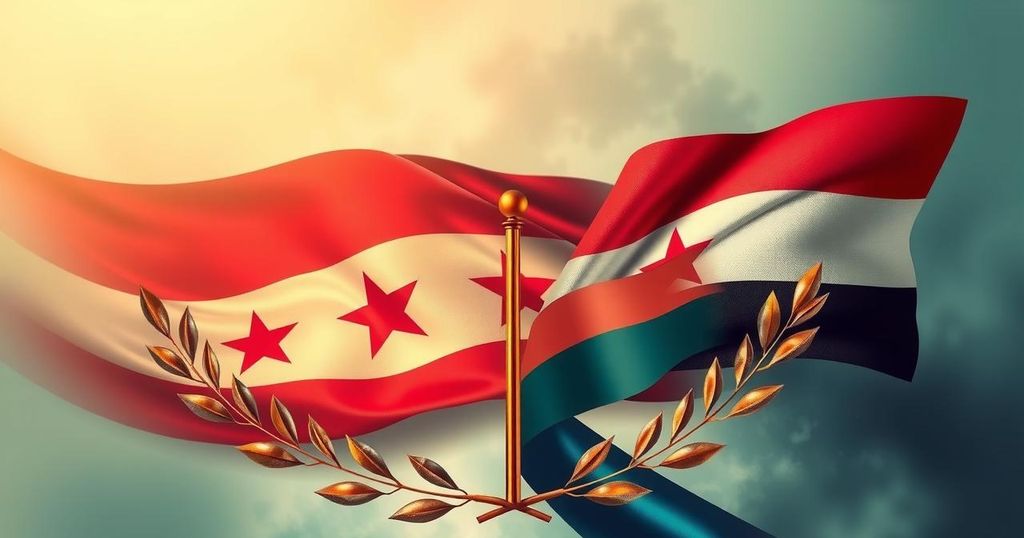Cautious Optimism for Syria: Four Months into Transition and Key Challenges Ahead
Four months into the transitional government in Syria, analysts express cautious optimism. The country confronts major challenges, including an unstable economy, the need for skilled professionals, and the impact of sanctions. Relationships with regional players like Saudi Arabia and Turkiye are pivotal, while the absence of large-scale sectarian violence post-Assad is viewed as a significant achievement. Moving toward normalization with Israel is seen as essential for future stability and development.
As Syria shifts from the longstanding rule of the Assad family, analysts emphasize a cautious optimism regarding the country’s future. Ghassan Ibrahim, a Syrian analyst based in London, highlighted the hurdles facing the new transitional government headed by President Ahmad Al-Sharaa, including institutional disruption, poverty, and the impact of sanctions on the economy. He remarked that while there are hopeful prospects, significant challenges in rebuilding the nation remain.
The economy presents a grim outlook, with more than 90 percent of the population living below the poverty line and essential infrastructure in disrepair. Ibrahim noted that, despite Syria’s wealth in natural resources such as oil and gas, these resources remain largely untapped due to a lack of skilled professionals following a mass exodus over the past fourteen years. The government is faced with the daunting task of creating an environment conducive to attracting talent and investment as they work to establish stability.
Ibrahim stressed a crucial achievement in the absence of large-scale sectarian violence post-Assad’s departure. He acknowledged that while instances of violence, like recent killings in coastal regions, have occurred, they have not escalated to a broader conflict. He reiterated, however, that the Syrian leadership must focus on rebuilding the state and avoid any actions that resemble militia behavior.
In terms of foreign relations, President Al-Sharaa’s visit to Saudi Arabia is viewed as a strategic attempt to realign Syria with regional powers and promote stability. Ibrahim emphasized the importance of building partnerships with neighbors and leveraging their influence to reintegrate Syria into the global community. He considered Al-Sharaa’s outreach to the UAE as pivotal for garnering support.
The situation with Turkiye poses complexities, especially regarding Kurdish issues. Ibrahim expressed concerns that while collaboration with Ankara might stabilize parts of Syria, it could also rekindle rivalries that threaten peace. The potential for renewed conflict with Israel remains a significant concern, particularly as hostilities in southern Syria continue.
Despite these tensions, Ibrahim observed a growing recognition in Damascus that a stable relationship with Israel would be more beneficial than engaging in provocations. He noted Iran’s continuing destabilizing role within Syria, but suggested that Tehran’s influence is lessening over time, as Damascus distances itself from Iranian militias.
Ibrahim articulated that the ongoing economic sanctions imposed by the US and Europe hinder the new government’s effectiveness. He posited that lifting these sanctions is critical for revitalizing Syria’s governance capabilities and preventing civil unrest. He cautioned that without improved living conditions, popular frustration may lead to conflict.
The composition of the new cabinet has also been scrutinized, with some minority groups feeling excluded from the decision-making process. Ibrahim underscored the difficulties President Al-Sharaa faces in balancing diverse interests while striving for national unity. Concerns regarding negotiations involving Turkiye and defense agreements were also raised, indicating Syria’s desire to maintain agency in its foreign policy.
Russia is recognized as a pragmatic partner for Syria, with potential roles in facilitating conversations with Israel due to its established relations. Ibrahim concluded by asserting that Syria seeks to be a hub for stability, economic development, and normalization with the international community, including Israel, to foster peaceful relations going forward.
In summary, Syria is currently navigating a critical juncture in its history, marked by cautious optimism as it transitions away from the Assad regime. The new government faces significant challenges, including economic hardships and the need for effective governance amidst the backdrop of international sanctions. Foreign relations, particularly with regional players like Saudi Arabia and Turkiye, as well as emerging dynamics with Israel, highlight the complexities the government must manage to forge a stable future. Ultimately, the desire for normalization and cooperation appears to be the guiding vision for a hopeful yet precarious path ahead for the nation.
Original Source: www.arabnews.pk




Post Comment